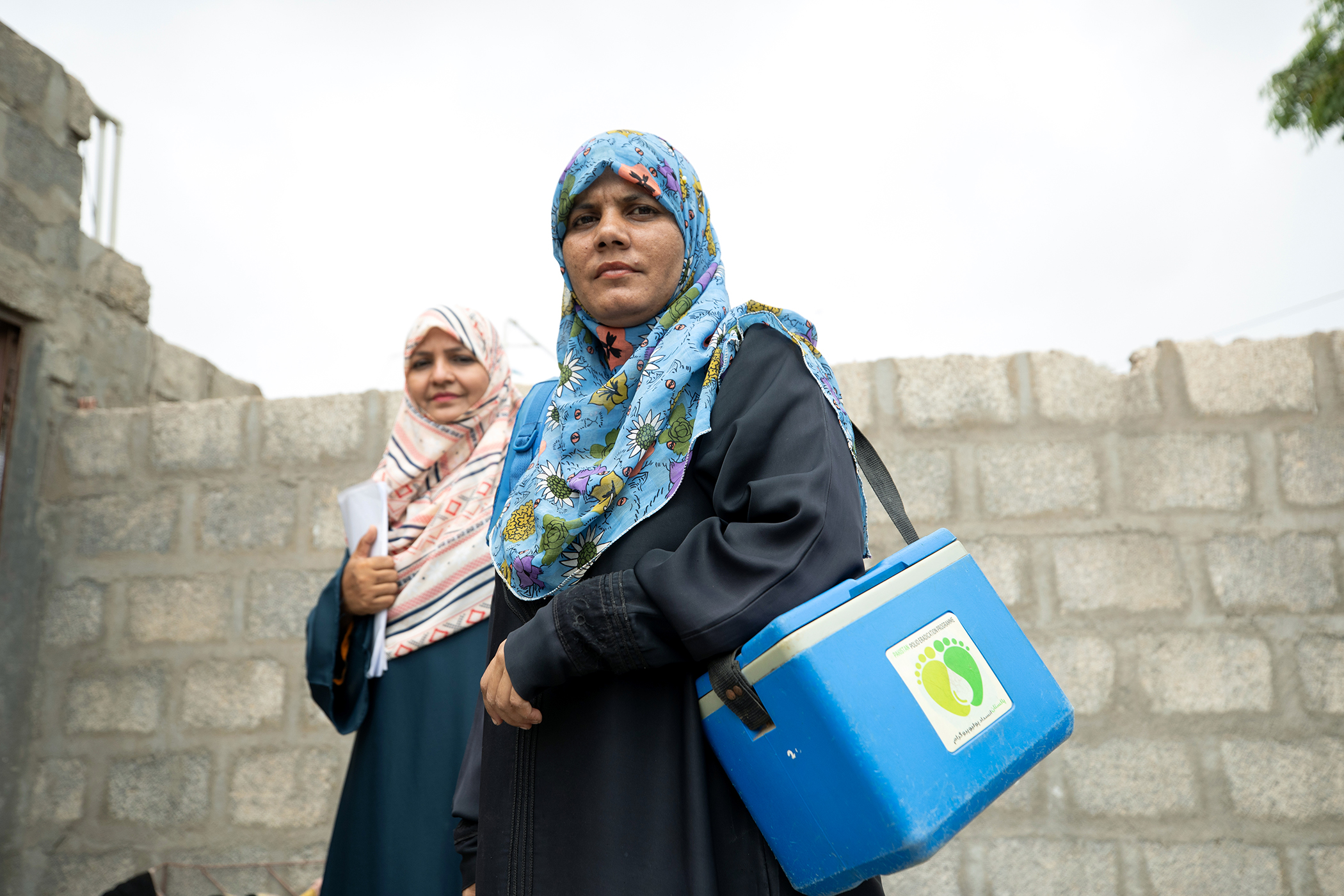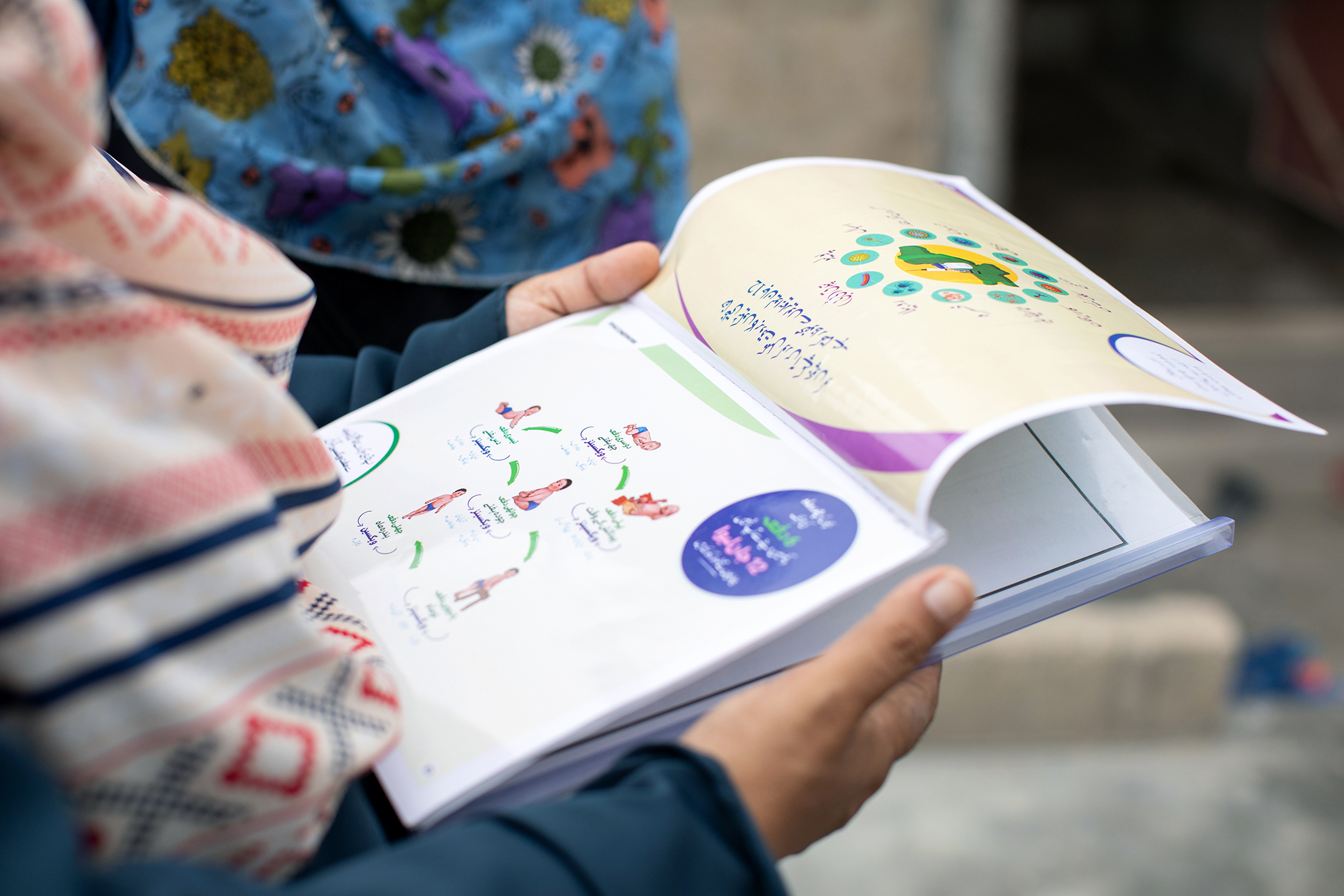In response to 18 confirmed cases of Wild Poliovirus type 1 by August 6 of this year, Pakistan has launched three nationwide vaccination campaigns in 2025, reaching over 45 million children in each round. The campaigns, implemented by the government-led Pakistan Polio Program, together with UNICEF and WHO, aim to halt the spread of the virus.
Polio, a highly infectious viral disease that can cause paralysis and even death in children, spreads from person to person predominantly through fecal-oral transmission. While it has no cure, polio is preventable with safe and effective vaccines for children that provide lifelong protection.
As community health workers bring the vaccine to children’s doorsteps, refusals are common. UNICEF shared with Global Citizen that this year, parents of approximately 60,000 children refused the vaccine in each vaccination campaign.
“We typically achieve a 70% to 75% conversion rate among refusal households during each campaign, meaning that around 3 out of every 4 children from initially refusing households are eventually vaccinated,” said Nofil Naqvi, a communications officer with UNICEF in Pakistan.
Naqvi explained that when a frontline worker encounters a refusal household, they document this and refer them to a social and behavior change team, who work on educating them about the vaccine, sometimes through local leaders or influencers, which leads to some households choosing to participate in the campaign.
Pakistan, alongside neighboring Afghanistan, is one of only two countries worldwide where polio is endemic, due to a range of factors, including misinformation that leads to vaccine refusals and community boycotts of the polio vaccine.
Global Citizen interviewed Sana, a 29-year-old mother of five children from Karachi, Pakistan, who shared, in her own words, why she initially refused to vaccinate her baby when health workers came knocking on her door.
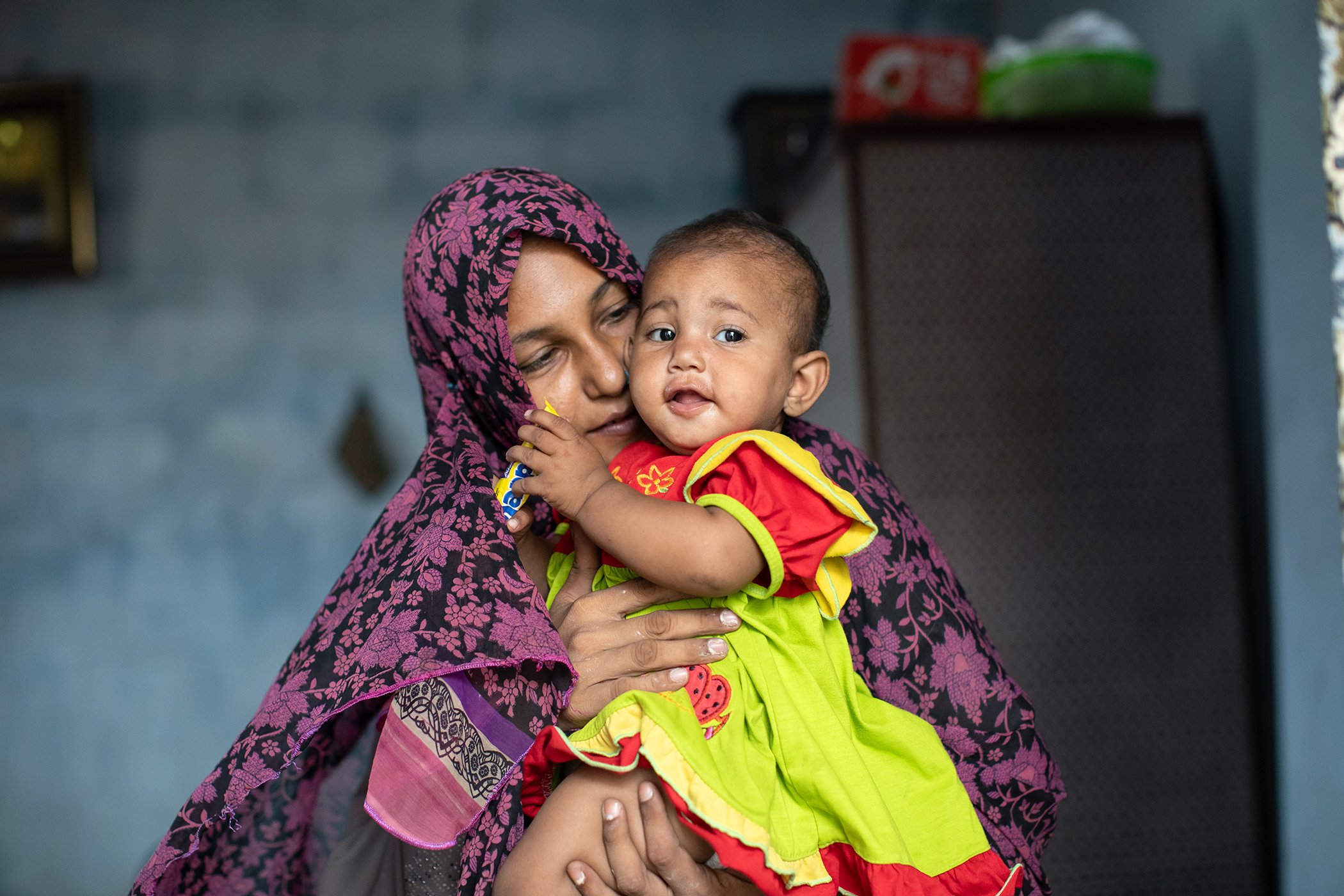 Sana, 29, is photographed with her 8-month-old daughter Amyra, at a community mobilizer's home in her neighborhood in Karachi, Pakistan on July 30, 2025.
Sana, 29, is photographed with her 8-month-old daughter Amyra, at a community mobilizer's home in her neighborhood in Karachi, Pakistan on July 30, 2025.
I’m a mother of five children and we live in Karachi. My husband works in a factory, so I am the one who cares for the children at home.
Around one year ago, someone sent me a video on WhatsApp of a Pakistani woman saying that vaccines are poisonous to children and can paralyze them or cause infertility. I’ve also seen these types of videos on Facebook. I don’t know the woman personally, but I believed her.
I’m not the only one who has seen these videos and we’ve had conversations about this as a family. I vaccinated my four older children — but at the time, there were no rumors about vaccines being bad. My children are all healthy and didn’t experience any side effects, but seeing these videos on social media made me hesitant to vaccinate my youngest daughter, Amyra.
There were polio vaccination campaigns happening earlier this year, and all young children were being targeted for vaccinations. I had conversations with people in my neighbourhood who tried to convince me to participate, but I told them, in my heart, I just can’t allow my child to be vaccinated. Everyone else on my street vaccinated their children. I was the only one who refused. Amyra is so important to me and I could not imagine damaging her health.
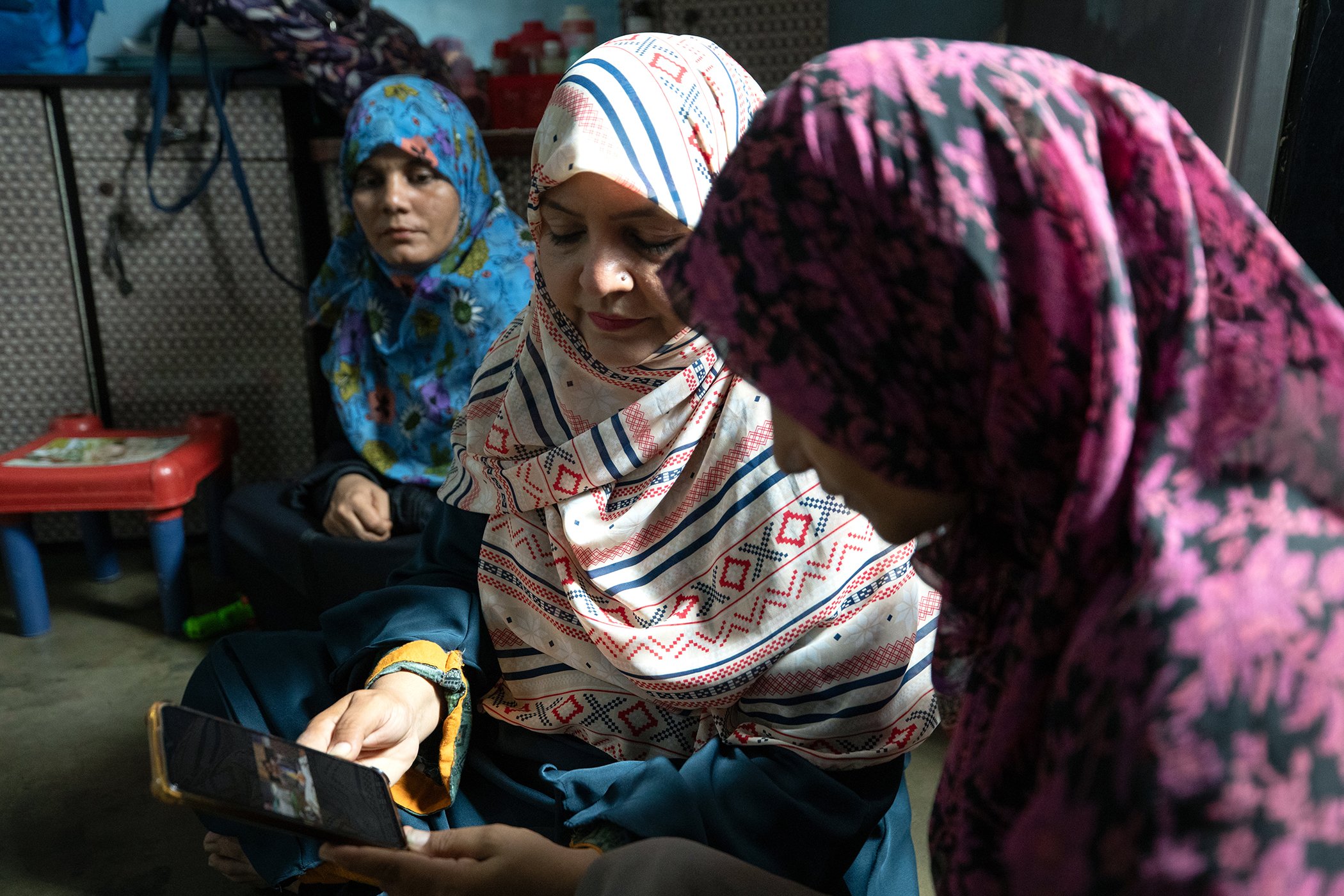 Community Mobilizer, Nusrat Bano (C), and Area In-Charge, Amber Ahmed (L), show Sana (R) a video of a journalist retracting misinformation he had spread in a previous video that aired on a local news channel in Karachi, Pakistan. That previous video had reached Sana on Facebook.
Community Mobilizer, Nusrat Bano (C), and Area In-Charge, Amber Ahmed (L), show Sana (R) a video of a journalist retracting misinformation he had spread in a previous video that aired on a local news channel in Karachi, Pakistan. That previous video had reached Sana on Facebook.
There are so many illnesses which impact children here, like diarrhea. I wondered, why do the health workers only go door-to-door to visit us when it’s about polio and measles? They don’t even come around to check our children’s temperature.
When my baby was four months old, a team of social mobilizers came knocking on my door to raise awareness about the polio vaccine. I did not open the door for them, but they returned. The next time they knocked on my door, I told them that I refused to allow my baby to be vaccinated.
For the next month, the team visited my house repeatedly, but I refused to accept what they were saying. I did not even want to speak with them. Then one day, I thought to myself that if they keep coming to speak with me about this, it might be important. I was open to discussing it with them.
One of the mobilizers was a woman who talked me through the issue, and cleared up the rumours I believed. I asked her all my questions: How can I believe you? Why are there so many rumours about this vaccine?
I learned that children are not paralyzed by the vaccine, but that they face a risk of being paralyzed if they are not vaccinated against polio. I also learned there is no medicine you can take to reverse or treat polio which is why it is not like other illnesses.
I didn’t know the health worker personally, but she is from the local health department and I came to trust her. I trust God, and after that, I trust the community health workers, especially her. We spent two months discussing my questions, and I decided I wanted to vaccinate my baby.
When it comes to health decisions, I usually consult my husband. We want our children to live good, healthy lives, and to pursue education — that’s important.
My husband did not agree with me about getting Amyra vaccinated. But I had spoken to the health worker and I understood her, so I felt I could make the decision without my husband’s consent. I know that if my daughter were to get polio and fall ill, it would be my responsibility to care for her, so I am the one who should make the decisions regarding her health.
She received the vaccine in May and was fine. When my husband saw this, he changed his opinion.
If I were to speak with another mother who was hesitant to vaccinate her baby, I would understand her concerns. I would share with her what I learned and encourage her to educate herself too, for the well-being of her children.
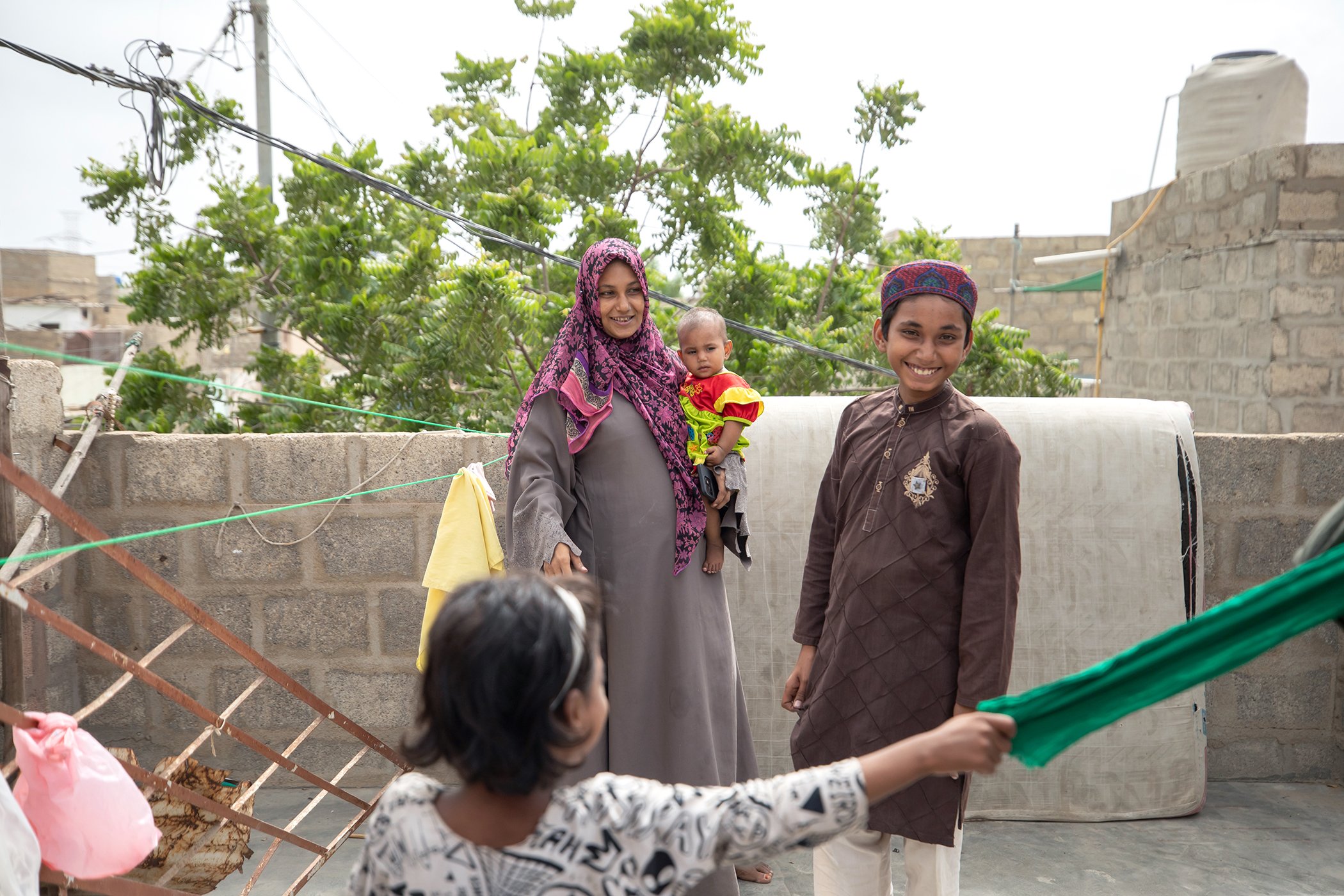 Sana, 29, plays with her five children at a community mobilizer's home in their neighborhood in Karachi, Pakistan on July 30, 2025.
Sana, 29, plays with her five children at a community mobilizer's home in their neighborhood in Karachi, Pakistan on July 30, 2025.
Editor’s Note: This article is part of Global Citizen's original reporting on polio worldwide, made possible by funding from the Bill & Melinda Gates Foundation.
